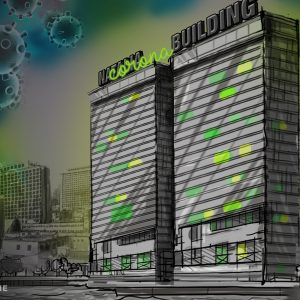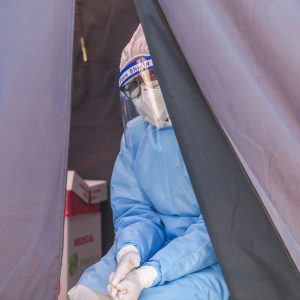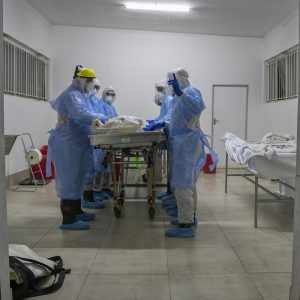How Pietermaritzburg is faring with Covid-19
Nurses are still short of PPE and although some residents are upbeat about how the city is handling the pandemic, others say ‘corona fatigue’ has set in and people are lowering their guard.
Author:
1 September 2020

Pietermaritzburg, which has the second-highest number of infections in KwaZulu-Natal after Durban, made headlines in August when it demoted the acting chief executive and suspended two managers at Northdale Hospital after the death of Sibusiso Khumalo, 67.
Khumalo reportedly died of hypoxia on 1 August after being admitted to the partially covered parking lot of the hospital, which had been set up as a facility for patients.
The Democratic Nursing Organisation of South Africa (Denosa) has expressed dissatisfaction at how the province is handling the pandemic. But the biggest problem continues to be the shortage of quality personal protective equipment (PPE), according to Denosa provincial secretary Mandla Shabangu.
“It is beginning to show that the KZN health department was not fully prepared for the pandemic. There is no plan on how to close the gap between the infected healthcare workers and those that are overburdened and swamped in the healthcare facilities.”
Shabangu said some healthcare workers were being intimidated to return to work before completing the mandatory 14-day self-isolation period. “Our biggest concern right now is that the healthcare system might collapse because we have the infrastructure, but we don’t have the warm bodies to handle the pandemic.”
Related article:
Although still trailing the Western Cape, Gauteng and Eastern Cape in number of coronavirus deaths, active cases in KwaZulu-Natal on 30 August stood at 14 935, second only to Gauteng with 24 777.
High-profile people in the province have contracted the coronavirus. Inkatha Freedom Party founder Prince Mangosuthu Buthelezi, who recently celebrated his 92nd birthday, fell ill and had to self-isolate but has since recovered. And King Goodwill Zwelithini has lost several family members to the virus.
Council concerns
Covid-19 district command council co-chairperson and Msunduzi District mayor Thobekile Maphumulo has expressed concern about residents’ behaviour.
“In most cases when we visit the CBD [central business district], you find that people are not practising social distancing, they are not wearing their masks and they are going about their lives as though we were not in the middle of a pandemic.”
She has also been concerned that young people are not adhering to lockdown regulations. “Some of them still gather and then they go back home to their grannies, and then grannies get sick. This places a lot of the elderly at risk.”
Related article:
Maphumulo said the council is most proud of the elderly, who are complying with regulations by staying at home. “We need to understand that Covid-19 is going to be a part of our lives for a long time and so we cannot afford to be the next epicentre.”
“Another big issue is the funerals,” she added. “People are still not complying with the regulations of 50 people per funeral, especially in rural areas.”
New fridges
Khayelihle Funeral Services owner Muzi Mkhize said he saw a significant increase in the number of deaths in Pietermaritzburg in July.
“People are not complying with the lockdown regulations at funerals,” he said. “Although they wear their masks, they are not covering the areas that are required to be covered and there are still far too many people attending funerals.”
He has had to build 20 new fridges in addition to the 50 that are already full.
Even though his clients do not comply with the regulations, Mkhize is ensuring that he plays his part, he said. His company prepares the venue for only 50 people. “We offer an attendance register and print 50 programmes, but you find that people add their own chairs behind the ones that we have set up and this is a matter of grave concern.”
Related article:
He said this happens particularly when a respected member of the community is being laid to rest. “What I am seeing as well is that people are trying to comply, but the government is not meeting us halfway insofar as helping them to comply.”
Mosa Moshabela, dean of the school of nursing and public health at the University of KwaZulu-Natal and the institution’s Covid-19 expert, warned that the worst is not yet over.
“People need to realise that while the numbers are decreasing, we need to continue with the preventative measures because if we don’t, we will see a second wave … and we don’t want to see that happening again,” he said.
Moshabela added that President Cyril Ramaphosa’s decision to move the country to level two of the Covid-19 lockdown on 15 August was risky but necessary for the government to manage the massive job losses the country is experiencing.
Covid-19 fatigue
Pietermaritzburg Economic Justice and Dignity Group researcher Julie Smith says Pietermaritzburg residents are doing all they can to protect themselves.
“I see taxi drivers have the windows open and the commuters are wearing masks. People are making an effort to practise social distancing, sanitising and washing their hands. What more should they do? We just need to ride the wave because there is nothing more that people can do. They are doing the best that they can under the circumstances.”
Smith says that, realistically speaking, people cannot absorb any more of the shock of the pandemic. “Covid-19 has broken people, relationships and homes. People are not okay. It’s been five months since lockdown began and everything that you could implement for your survival has already been exhausted.
“All we have is our bodies and they, too, are not strong enough to handle what is happening,” she says. The province was not prepared enough to deal with the extent of the loss of lives, adds Smith, and the government needs to do more for its citizens.
Related article:
But a resident who asked to remain anonymous says she feels that residents are suffering from corona fatigue and not adhering to safety guidelines.
“If you meet for a picnic where you all stay 2m away and bring your own food and don’t share anything, then that should be all right. But we know that mostly doesn’t happen at all. People sit on top of each other, hug each other and share food. As if all is back to normal,” she says. “What people don’t seem to get is that you expose others when you hug or socialise. And that is how it is spreading.”
She is also concerned about nurses that have been sick and had to be off work for 14 days to self-isolate.
“Our medical staff are taking huge strain. People are basically giving the medical profession a middle finger by not adhering to regulations, but will be the first ones begging those same medical people to help them when they get sick.”



